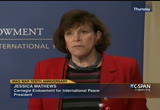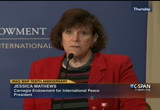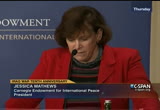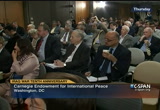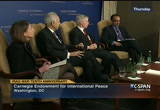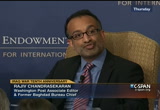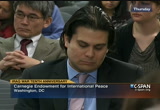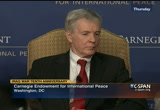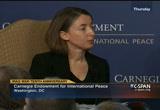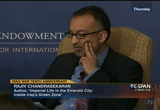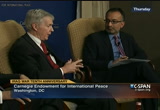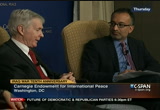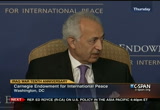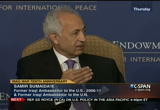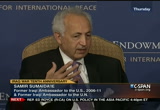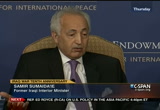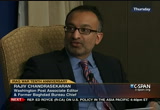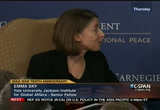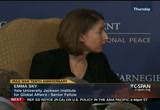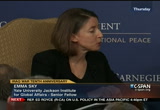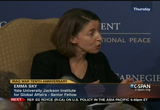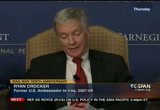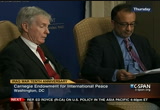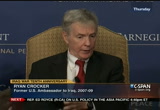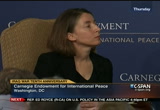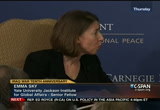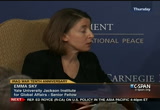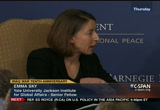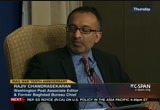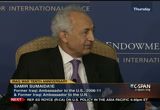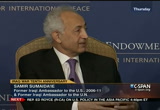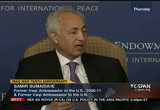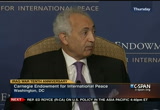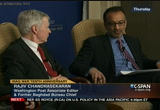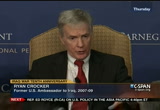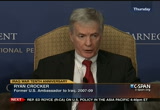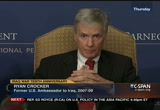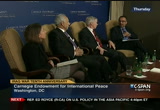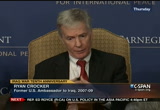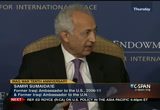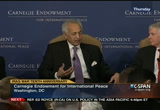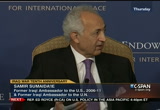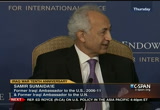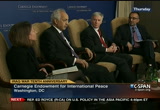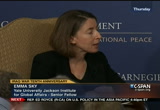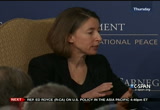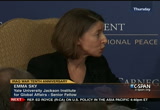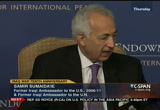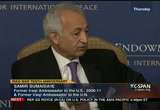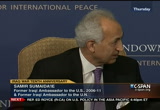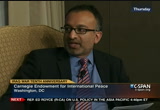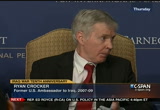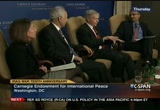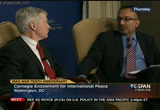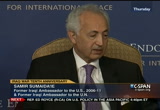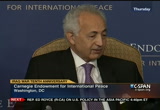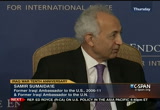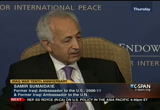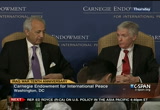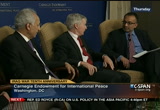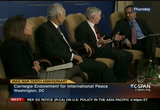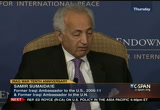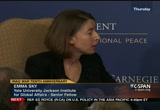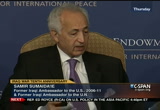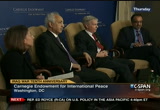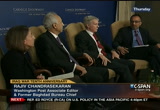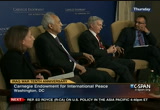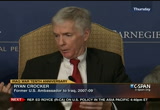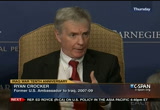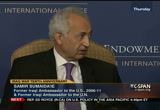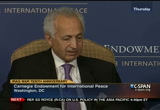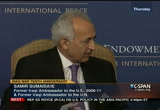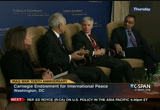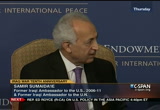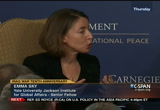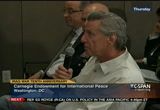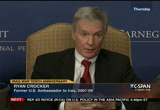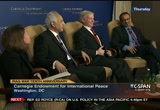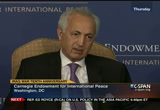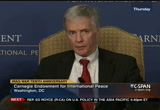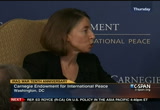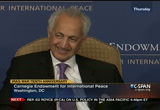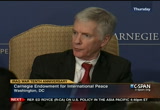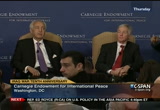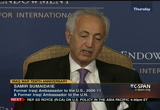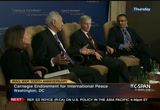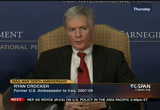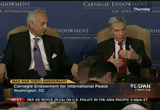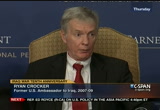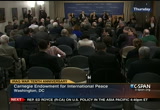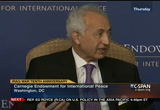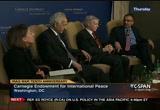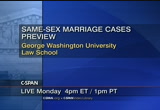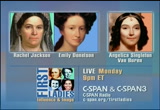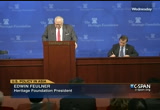tv Carnegie Endowment Forum CSPAN March 24, 2013 3:05pm-4:40pm EDT
3:05 pm
draft of history, then 10 years is certainly time enough to step back and reevaluate and perhaps a time for a good third draft. we cannot trace all the defense, all the issues, and the impacts of the war today. we will not do justice for example to a critical set of questions about how we got into the war, and there is a good deal of revisionist history that has been going around this week on that topic. this is i think critical for understanding what happened and why it happened and the central to understanding to avoiding a repetition. it we will not try to treat in detail the impact of the war on the lives of individual iraqis. but we are going to cover a lot of territory, and what for us seemed to be the critical three sets of questions.
3:06 pm
choosing those, we have one eye on the past and one that is very firmly set on the future. we are asking first what is the state of iraq today, how far towards the u.s.' original goal of a functioning democracy has it come, and what is the outlook for this country in the region, for its neighbors, and that will be the subject of our first panel. we are then going to look at the economic costs of the war. you may remember the president bush's economic adviser was fired for predicting that the war might cost $100 billion to $200 billion. he was off by a factor of 10, and as we are going to hear and our second panel, made much more than that. finally, we are going to ask
3:07 pm
from the u.s. point of view, what are the geopolitical and military and strategic lessons in so far as we can see them from this near and far vantage point? what are the take-homes from this conflict? wonderfulsembled a first panel. i have no question that however much each of us knows about this conflict firsthand and more, looking around this room, there's a huge amount of wisdom here, but i know all of us are going to go home from this a good deal wiser. i thank you for joining us, and i really am thrilled to turn over to the moderator of our first panel. everybody in this room and watching on television probably is deeply familiar with his work.
3:08 pm
in years ago, he was covering the beginning of the war from kuwait city and from baghdad. he later wrote the apparel life in the emerald city, one of the best of many books about the war, and we're very lucky to have him. so the mike is here. >> thank you, and thank you all for coming this morning. tohear what i think is fun be a fantastic lineup of speakers all day. 10 years ago today, the lead story on the front page -- u.s. forces punched into a broad front tonight, using territory along the kuwait border with moderate resistance. a second torrent of u.s. cruise missiles destroyed several buildings in baghdad. two days ago, this is what a colleague wrote -- 10 years after the united states'
3:09 pm
barreled into iraq, the country is neither the failed state that seemed all but inevitable during the darkest days of the the democracy that out to form. this a country threatened by local conflicts that could drag it back into a sustained but shed its citizens knows so well. that is what we're here to examine this morning. the 13 months after the last u.s. combat forces the part of the country. what is iraq today? upit on the press as political dysfunction, another civil war?
3:10 pm
or is it poised to muddle through, killed by oil revenue, competence security forces, and a prime minister who has managed to establish control over a fractious government? or is it all those things? this is not a discussion rooted in the past. we will not relive the wmd questions. we will not dwell on the mistakes of the coalition authority, and we will not debate the surge. andill look at iraq today where it is headed. a has been little of that in the 10 years media coverage, even though it is a far more
3:11 pm
relevant question for policy makers and the public today. with that, because you did not come here to hear me today, that we introduce the plan all. you on the who they are. you know their contributions to the efforts to stabilize iraq. to my right is ambassador ryan crocker, who is the kissinger senior fellow at the el universal. he has served recently as our ambassador to afghanistan, his long career included ambassadors for iraq as well as our ambassador to pakistan, syria, kuwait, and lebanon. from may to august of 2003, he served as the government's director for the coalition provisional authority in baghdad, and his career in the foreign service included a tour in lebanon at the same time in the early 1980's, at the moment
3:12 pm
of the it israeli invasion as well as the bombing of the marine barracks. to his right is ambassador samir sumaida'ie. in 2006 he moved here to washington to serve as iraq's ambassador. prior to his appointment to the united nations, the ambassador to serve as the minister of interior in baghdad. ofore that he was a member iraq's governing council. he is currently working as a consultant and a writer. to the far right, is a senior fellow at the yale jackson
3:13 pm
institute. she has worked at senior levels on behalf of the united states and united kingdom government and in israel. into this and three, she was the government's director in kirkuk. was best known for serving as the political adviser for general odierno. instead of asking our panelists to deliver a long opening statements, i will ask them to be ready to tackle three questions at the outset before we launch into what i hope will be a robust discussion. the three questions which i will address our to talk about the state of iraq's domestic politics, iraq's role in the region and iraq's relationship with the united states. let's start off with domestic politics. iraq today is a tinderbox with red-hot embers inside, disputes about political power. it seems the government is crumbling. notfinance minister will leave the anbar province for
3:14 pm
fear of being arrested. another has been boycotting government meetings in the capital and remaining in the kurdish-controlled north. and ministers have also to foist that they will boycott the government in recent days. i would like the panel to give their assessment of the domestic situation, and let me start with ambassador crocker. if prime minister maliki turning himself into an autocrat? >> is a great question, and i thought you had a great quotation from the article two days ago. iraq is haunted by its past. maliki is haunted by his past,
3:15 pm
recent and not so recent, in my view. he came out of a clandestine movement that was severely persecuted under the saddam years. that conditions his behavior. it is said in iraq by the prime minister that only two men successfully governed iraq. i do not think maliki is trying to be the next saddam hussein. the politics and conditions in iraq will not permit it. he is afraid he may be the next kassam who overthrew the monarchy in 1958 and who was a pretty able political figure. he was making deals, breaking deals, bestowing a favor, withdrawing favor, but eventually it got away from him. to read maliki correctly, the best perspective is someone who is playing defense, who is trying to stay in power, who was trying not to go the same way as kassam. >> thank you. ambassador, let's talk about sunni politics. largehave been demonstrations. what are the chances that the current state of sunni frustration , anger, sense of disenfranchisement will spill into something more violent and destabilizing? >> it is already spilling out into violence trick we hear
3:16 pm
every few days of explosions, acts of terrorism. they're not totally disconnected from the general dissatisfaction of the population, and there is a great deal of dissatisfaction among oust the iraqis about but i want to elaborate on that. get back to the mindset of the government. ambassadorally with crocker's assessment of the way maliki thinks, but i would like to add to it that iraq is a state -- whoever controls the
3:17 pm
3:18 pm
the group that rules. they put their hand on that and they will not let that go. coming back to the sunnis, i remember growing up in a country where the sectarian divisions were not really relevant. we did not who was sunni or shia. a sectarian policies of regime and the oppression he imposed on the shia, this sense of being persecuted was strong amongst the snia. the opportunity came, there was a segment, the islamists, who were thinking now, we have got it, we will never let it go. it will be a shia government.
3:19 pm
that put the sunnis a difficult position, and in the early days they brokered the political process. that did not work. they then joined in it. that is not working. now they are caught in a difficult position. they do not want to go to the extreme where al qaeda is because they get themselves where victims of al qaeda. at the same time, they are being marginalized and being treated as second-class citizens. it is very difficult. i must say that their general dissatisfaction is a much s is part of a much wider dissatisfaction. they will feel that there are no services, no security, no progress, no jobs. where on earth are we going?
3:20 pm
the country seems to be in this situation where it is not moving at all. >> fantastic. much to delve into, and the circle back particularly on the allocation of will on revenue of a broader dissatisfaction. tell us about the state of kurdish-era politics at the moment, all these concerns that moves by the kurds enter in selling their oil from the north and or i should use that word carefully there, oil, oil extracted in the northern parts of the country and their efforts to sell that further stoking tensions with the central government. help us understand as well as obviously key unresolved land rights issues of in the north, help us understand where things stand today. >> at one level kurdistan is
3:21 pm
the success story of iraq. there is much more employment. feele feel happy and they is in better than they have had in the past. at one level this is the kurds' moment. the nation's between kurds and baghdad have never been so poor. there is an absence of trust among the elites in iraq. this boils down at the moment to personal disputes between the president and maliki. maliki leaders fear that is becoming an autocrat. their sense of history, they are affected by it in the same way that maliki is affected by it create the kurdish sense of history always make them fear the central government, and they see the tanks, the f-16's could be used against them, so
3:22 pm
is a huge distrust. talabani was president who served as the mediator between the president and maliki. and now there is nobody who was brokering that this agreement. there really are substantial issues to be dealt with. the issue of land was supposed to be resolved after the constitution. it has not been resolved. in those disputed areas, if they become part of kurdistan, all this that should have been put in place have not been put in place, whether a sense of referendum, none of that has happened. the kurds are frustrated in
3:23 pm
thinking that is never going to happen. you also mentioned the oil issues, and the kurds have been exporting their oil, as you call it, three trucks to turkey, three trucks to iran, and there is talk now about a direct pipeline between turkey kurdistan. willhave been giving out contracts to international companies, and some of those contracts have been for building a in disputed territories. the central government is a great concern because they fear that if the kurds can have a direct pipeline with jerkily,
3:24 pm
that will lead to the breaking off of iraq. we sell in the months last year and the year before the movements of iraqi security forces facing off against each other in the disputed territories. when u.s. military was there, it served as a mediator between the different forces. now there is no mediator and there is concern that it only takes one shot to get the spiral of action. recently, the budget was pushed through parliament without the agreement of the kurds and with many of the iraqi members boycotting it. but that is what has led to the kurdish boycotts of government because they fear that maliki does not want to share power, they now fear they are not equal partners in iraq. we're back at the beginning in 2003 and 2004, where we heard kurdish leaders say now for the
3:25 pm
first time i feel iraqi. more and more the kurds are becoming autonomous, they are seeking economic independence from baghdad, so they are drifting further and further apart. >> so much there. we could spend the next hour just following up on this stuff. i promise we will get back to all of it. i want to talk about iraq in the region and iraq and united states and we will circle back. it obviously it's to much concern about the relationship that has been forged over the past several years between baghdad and tehran. ambassador crocker, give us your sense of the true nature of the air around iraq and iran today. >> if i could give you an accurate assessment of the true nature of the relationship between iran and iraq today, it would be elevated to a celestial status. which may happen, but it will not happen this morning. [laughter] complexhighly
3:26 pm
relationship. there can be no question that following the withdrawal of all u.s. troops in 2011 and to speak frankly i think a waning engagement at other levels, it has shifted a balance showed that -- so that iranian influence in iraq is greater than ours is less strict there's no question about that. at the same time, i do not buy into the tendency in the west and in the united states that iran calls the shots and gives the orders because it is, one, a shia government in tehran, dealing with another shia government in iraq. i think that differences that often lose sight of between and persian, the, again,
3:27 pm
history, history, history, the bloody history between iraq and iran, the brutal war of 1980's, which we tend to have forgotten, but no iraqi or iranian ever well, remains fresh in the memories of the questions. iraq is, whether sunni or shia, is profoundly an arab state and for many years was the vanguard of arab nationalism. i think we are going through an interval here wear because people lack a regional or international balance, iran has a disproportionate influence in iraq, but i think the farther they pressed that influence, as i saw during my time there, the more iraqis tend to push back and resent it. so i would seek probably a prolonged period where this will play out.
3:28 pm
iranian coverage is going to produce an iraqi backlash. they will have influence. they will not have control. >> let's talk about syria. there is a tendency here in washington to view maliki's acquiescence to overflights because of pressure. maliki has his own reasons for wanting to have assad in power. is a kinship between shia and alouites, is a concern that if his government is toppled it puts pressure on sectarian tensions within their record to
3:29 pm
help us understand why the maliki government is taking the position it is, regarding the conflict in syria. >> you look for simple explanations. many international jihadis entered iraq and committed acts. whether they facilitated or not, they did not stop it. in 2009 after a particular set of horrific bombings, maliki wanted to take them to a criminal court. it looks like rushing, when people see an uprising in spirit, it looks like iraq in 1990, 1991. how did this come about? --is simplistic to say that more the issue is maliki and
3:30 pm
shia is they must see the threat facing them in the same way that iran sees the threat, and by the threats, i mean this fear of the sunni regime's getting together, coming together to overthrow the shia regime of assad and then overthrowing the shia regime in baghdad. is this fear of the alternative. it is fear is assad is on the turn, that people will come to power of the most salafi branch of the opposition, and that is propagated through the media, in dialogue between people. the relationship between the syria and iraq is very complex
3:31 pm
because of the different communities inside of iraq have to relations with syria. yesterday when robert ford went testify, he testified about how the iraqi government was not preventing weapons from iran reaching syria. he also described how shia extremists were inside syria fighting on behalf of the regime, and there are also plenty of sunnis fighting in syria, and going back and forth, and also kurds inside syria see an opportunity, and there is fear that if assad goes, kurds will become more empowered, and how will that affect kurds inside iraq. they are all interconnected. >> and looking at the interconnections, let's branched out a little more and look at iraq more broadly in the
3:32 pm
arab world. ambassador, we are more than a year on from the start of the arabs spring. iraq has a large border with iran, but also the border is jordan, saudi arabia, kuwait is a player. the us understand how maliki government sees its relationship with the broader arab world at the moment and how its neighbors, beyond iran and syria, which we have talked about, view iraq today. >> back in 2003, in the days of the governing council, the first senior delegation received outside iraq was not from
3:33 pm
3:34 pm
into the situation, particularly exasperated by the shia political parties themselves looked at this as an opportunity to seize power in iraq, as shia, not iraqi. there is fear on both sides feeding on each other. the iranians proved to be very adept, and they moves swiftly. they utilized their investment in shia islamists who were nurtured in iran during the saddam period and built close relations with the leaders of the islamic republic. they never looked back from there. coming back to the arabs, the more they see of this, the more
3:35 pm
estranged they become from the new iraq. iraq has traditionally been as he correctly said, ambassador, an arab country in its identity, as it looks at itself, but a country with a proud american history. there is another layer now, a layer of sectarianism, which has been struggling with a layer of nationalism. there is one symptom, but at the political level, at the leaders of the islamic parties, there is a different kind of -- therefore, as we progress from 2003 into the turbulent years of 2006, 2007, the arab press the other arab countries started to point out chaos, failure, all because of the iranians, and the american
3:36 pm
neveragement, and we seemed -- and it was very hard to get iraq back into its arab niche. we got iraq into the arab league, but it remains a work in progress. integrated really back. that is where things stand. there is a recognition that iraq should be part of the arab but there is any between that sense
3:37 pm
and the sense that iraq is close to iran at the moment and that iranian influence is very apparent at the macro and micro levels. >> fantastic. so much to bore into. would like to talk about the state of the u.s.-iraq relations, and we will tell in the conversation on all this stuff. it has been 15 months since our last combat forces drove out of the country. there is a large diplomatic presence there. we still have some military personnel doing some arms sales and training their and our intelligence community as individuals on the ground. help us understand from your perspective iraq-u.s. relations today, and i would like to start out, if you might offer some thoughts, if the sofa process turned out differently, if we had 10,000 u.s. troops in the country today, would things be appreciably different? with iraq's relations with iran
3:38 pm
be different? would they be dealing with syria differently? if we had a military presence on the ground today in the thousands, would that give us any meaningful leverage in the politics of the country? >> i would defer to the ambassador for an iraqi perspective, but it seems to me that had those security negotiations succeeded and that we had a presence along those numbers, that is not enough to make a military difference, nor should it be. it would be a powerful signal in iraq to iran and in the region that the united states was engaged, involved, interested, and effective, and i think it would have reshaped calculations in capitals,
3:39 pm
starting with baghdad, and tehran, and right around the region. again, the military as it were, as a political presence, as a signal of u.s. engagement and involvement. ining my time in iraq, addition to the first security agreement, we had a long term should that was intended to that very simple. it was predicated on the assumption, which i think at the time both governments in united states and in iraq, shared, that there would be a
3:40 pm
successor security agreement. the intent on the sides was a signal for the first time since the 1958 revolution that overthrew the monarchy that rock was going to be a strategic partner of the u.s. in particular and of the world in general. exists,eement still still in force, but i think the full withdrawal of u.s. military, except for the small contingent left for training and equipping, reduced our leverage. i would say one other thing. you can still have substantial leverage in international politics without military forces. i am not sure that we have taken full advantage of those opportunities, and i hope very much as we enter a second obama administration that the administration is going to have a greater and deeper focus on the importance of iraq and did engage iraq more fully, more
3:41 pm
frequently, and at higher levels, because we have seen what happens when the relationship deteriorates, as it did after 1958, and particularly under saddam. with our military leverage gone, we need to take advantage of the agreement to increase our political leverage, not to make iraq do things, but to demonstrate to iraq that it has a partner, it has an ally, it has options other than looking to iran for all the reasons that emma sky just laid out. >> there is a limited bandwidth in washington in dealing with these issues, and part of the tragedy of afghanistan, was that we turned so much of our attention to iraq, and with the administration's focus in
3:42 pm
afghanistan, as well as a broader set of issues, it has come at a cost in dealing with it around. >> as has been said in the we are a great power and we can do more than one thing at one time. >> as has been said in the past, we are a great power and we can actually do more than one thing at one time. i think there may be a band with issue, but that is an attention issue rather than a capacity issue. again, we're not talking about deployment divisions. we are taking iraq seriously as our agreement says it should be taken and having the level of senior engagement that we should have in baghdad. becausee will see that it has been somewhat absent in recent years.
3:43 pm
>> how do the people of iraq view the relationship with the united states? >> if you asked an individual, you might get two different answers, so you can imagine if you ask that all of the people. they are conflicted about their attitude towards the united states. right from the beginning, some saw intervention by the united states as a threat and some saw it as salvation. those who saw it as salvation later found that they were disappointed in many respects. there were ships, even in the perspective of individual
3:44 pm
attitudes. the -- shifts, even in the perspective of individual attitudes. there was great elation the set on hussein was removed, for sure. -- great elation that said obama hussain was removed, for sure. but this was -- that saddam hussein was removed, for sure. at the government level, the strategic agreement is still in place, but it would not be wrong to say that the government of iraq at the moment does not the american presence or influence as an integral part of its political calculation. it was a few years ago when
3:45 pm
political decisions were taken. they always factored in what the americans fought and that was certainly true. you probably remember when your the ambassador to baghdad. i do not think that is the situation now. i would even ventured to say that there is more wait for what the iranian regime things political decisions in iraq, whether it is forming a cabinet or any other major political decision. but that does not mean that americans have lost all possible influence. i think americans still have a
3:46 pm
considerable amount of soft power. notink they should use it only with the government, and they are actually using it, to be fair, in support of civil society. i think in supporting the segment of population who are secular in their outlook, who believe that the separation of religion from the state is the salvation of the country, that is the natural ally of the united states, not the islamic side. i think there should be more support for the politics of secularism in iraq. it would not be wrong. in fact, i would say and be necessary and highly desirable for the americans to support
3:47 pm
their natural allies, which i happen to believe represent the future of iraq and i myself am part of, at a personal level. so, there is this conflict, and this conflict is not resolved on the boards. the outcome of this will depend on how much the united states is willing to put into the right factors to get iraq moving in the right direction. if they fail, it will be very unfortunate, but the people who will pay the price will be the people of iraq and american interests in the region. >> very quickly, the european perspective on the u.s.-iraq relationship. >> i think many people looking at that relationship feel that the u.s. wants to forget about iraq, start looking at it
3:48 pm
through the rearview mirror, look beyond. and people find that quite difficult to understand, after all that investment. huge investments in blood and treasure over the years. when you look at the time of surge, the u.s. reputation was way high and the iranian influence way low, and now the balance has completely changed. people think the u.s. has much more influence and is not wielding the influence it could have. people ask, why does the u.s. not do more to contain some of maliki's worst instincts? better do they not do a job balancing the different communities within iraq? and you can ask a follow-up question. >> how should the united states be doing that, and then i would love to hear from the others.
3:49 pm
how do you all believe the united states should be read calibrating its relationship -- re-calibrating its relationship, and to build on the point, if the natural allies of the united states are those more secularin government, how do you do so in a zero sum nature of iraqi politics without further worsening relationship with maliki? the think people believe u.s. debt on maliki in 2010. rather than -- bet on maliki in 2010. rather than long-term investments, it was seen as maliki is the guy. but the long term interest is for iraq to be more democratic. it is never going to be a liberal democracy in the gulf. but as the ambassador said, it is a strategic framework agreement which provides the framework to do that, to invest in institutions, to build a better relations with iraq's
3:50 pm
people. there is also the huge influence that the u.s. exerts with neighboring countries. baghdad needs the u.s. to use that influence to help iraq, to help baghdad, to help malick he himself have better relationships. and of course, there are the arms sales. will the u.s. continued to just sell arms, sell arms with no
3:51 pm
conditions placed on it? tothose arms are used oppress mr. maliki's domestic rivals? >> how else should the u.s. recovery that relationship? >> well, i think it is possible to have a two-pronged relationship, even with the government. we will support you, but we will not support aggressive action. we will support you, but we will not accept human rights violations.
3:52 pm
we will support the political process and the political system as long as it actively serves the principles on which it was felt. -- built. now let me make a very point of this juncture. weree beginning, when we writing the traditional -- transitional administrative law and later on when the peace was negotiated, there was an assumption that the players were going to abide by the rules. this assumption was wrong. some had no intention of
3:53 pm
abiding. asy went along, but as soon they got into power, they started flouting the rules, blatantly. i mean, explicitly, it is stated in the constitution of certain institutions are independent, like the central bank. the law made clear that it was independent of the government. i was the head of the media committee, and restructured a media commission that was intended to be independent. all of these have been reined in and the auspices and the control of the prime minister have done it on the basis of, well, these all have some executive functions and therefore they should be part of it. they are abusing the semantic definition. oft really means a kind hijacking of the power of all these institutions, which are
3:54 pm
the guardians of the democratic system. once these have gone, what do we have for this democracy? the americans should make it clear where they stand on these issues. the general perception in iraq is that, well, maliki is in power because both the iranians and the americans want him to be there. that should be dispelled. it should be clear that the americans are committed to the political system in iraq, not one individual, not one government. governments come and go, but they must be built on a foundation in order to be sustainable, in order to create the stability and therefore the prosperity that will flow out of iraq.
3:55 pm
>> what is the clearest way to do that? i mean, we talked a little bit about tariffs. is it time to reevaluate arms sales at this point? >> i think it is time to engage in a serious, sustained and high-level manner. and through that engagement, exert greater influence, frankly, with all the parties. i think they could all use it. and to use as your structure for that the framework agreement, because it is about institutions, their strengthening and their endurance, as well as it is about cooperation in a variety of fields that are of benefit to iraq as well as the united states. we have a very able ambassador
3:56 pm
in baghdad right now, but the nature of the relationship, the recollection of the iraqis over how it used to be, with routine high-level engagement, i think suggests strongly that to get at just the point that have been raised, we have got to of our game here. -- up our game here. i would very much like to see the secretary of state make a visit to iraq. in the previous ed ministration, for a variety of reasons -- previous administration, for a variety of reasons, the secretary did not visit. secretaries of defense routinely visit countries where we do not have troops deployed, but it would get everybody guessing, wouldn't it? likesimilar vein, i would to see the chairman of the joint chiefs of staff visit. these kind of visits provide a framework to get at questions like balances, institutions vs individuals, arms sales and their conditions and some useful words of advice, both to those in the ascendancy and to those in the opposition, because
3:57 pm
as i said, i think all parties need it. >> one individual who has not yet come of it is muqtada all solder. i am keen to hear your thoughts -- muqtada al-sadr. thoughts to hear your on him playing a constructive role as a shia nationalist figure and potentially seeking to break further from the broader shia coalition and ally his movement with sunnis and kurds, playing the role of a spoiler. would that be a positive development, in any of your views, or a prescription for
3:58 pm
even more trouble ahead? >> muqtada al-sadr has been a rather unpredictable player on the iraqi stage. he came in on a wave of love and admiration because his father was murdered by saddam hussein. his father was a singer, a writer and a clergyman, a remarkable person viewed with great respect. but there were those who venerated him. and this was his son. so, he was swept into this position of power, for which he
3:59 pm
had no qualifications whatsoever. therefore, he was a candidate for manipulation by people who had much more experience, including our iranian neighbors. so, his recent actions -- although i think his instincts were, as you pointed out, much more nationalist, iraqi, helping the board, but his political motivations were all over the map. what he will do the next day, the next month, if you ask them, i think he will get -- again, and answered today and a different answer tomorrow.
4:00 pm
it is difficult for me to sit here and say how he is going to act, but he is a factor and he will continue to be a factor. the next elections next year are going to show, hopefully, the more mature response from the electorate. having said that, i quickly add the qualification of this will be, again, colored and tempered by the fears of being whipped up right now. among the islamist shia, there is a weapon they use, the sunnis are coming to get you. and that is now amplified by the sunnis arabs are coming to get you.
4:01 pm
that makes the fear even more potent. the best things that the sunni arabs in iraq should do is try to alleviate this year. most of the wider element is aware of the danger of this fear, of government out of control. coming back to muqtada, the next elections, if they are not colored by a fervor, might produce a more mature out, and provide a new crop of younger leaders who have been less contaminated by the events of recent years.
4:02 pm
there is a ray of hope there. >> if i could just add to that, i agree entirely with the ambassador's assessment of muqtada al-sadr. he himself does not know what he is doing the day after tomorrow. sadly, assassination can be effective and the assassination of his father and two brothers has had a lasting effect on iraqi politics, as has another assassination. in the sadr family, that once stood not only for a moderate form of shia some but for iraqi
4:03 pm
and arab nationalism, we are now down to be shallow end of the sadr gene pool. [laughter] there was a period in 2008 when the hope was, which yo articulated, that dsadr, to -- that sadr would make that out reach over the sectarian divide to the sunnis. it never really happened, to immense relief of the kurds, therein lies the complexity of all of this. you can manage to make perhaps two out of three reasonably content, that getting three out
4:04 pm
of three has deluded us and the iraqis for the last decade, and iraq for the last century. there is a point of light to come back to with respect to the u.s. not only do i believe we need to be more effectively and decisively engaged with iraq, i believe we need to be more effectively and decisively engaged with the region on behalf of iraq. amade what i thought was pretty persuasive talking point that if you are concerned about iranian influence in iraq, why don't you reopen your embassies, how foreign minister's visit, invite iraqis to your capital and pushed back on persian influence with arab influence?
4:05 pm
it persuaded the, but persuaded no one else. as the region changes through the arab spring, i think this again a time for more active u.s. diplomacy in the region on behalf of iraq. >> i like to add a follow-up comment here. i agree entirely on this. but muqtada should not always be viewed as a free agent. in a recent episode when there was an attempt to unseat maliki in parliament by a vote of no- confidence, initially muqtada signed on on this action and
4:06 pm
this plan, but later withdrew. the affirmation i have is that he withdrew because so few of his lieutenants -- because a few of his lieutenants came to him and told him they could not protect him if he went through with this plan. i don't know, but it is the least -- it at least explain some of the capricious nature of his decisions. andakes a decision today then he changes it tomorrow to another thing. >> can i just make one final comment about muqtada? he is hard to read, but in the last few months, there has been a maturing in his behavior. he has chosen not to be more sectarian. tohas chosen to reach out the kurds and reach out to be
4:07 pm
sunnis. you have seen him going to lebanon. you have seen a change in his behavior, and he could have acted differently, so he deserves some credit for that. >> his instincts are right because he was brought up in that family. and this family is rooted in iraqi culture and history and is seen, unlike some of the as being very iraqi and arab, and for that reason, is loved by sunnis and shia alike. my comments of referred to iran in a negative sense throughout, but it is important for iraq to have a working relationship with iran.
4:08 pm
we have historical, cultural, family ties with iranian society and we have religious ties. and we have every year hundreds of thousands, if not millions of pilgrims who come from iran to visit the holy shrines in iraq. so, a healthy and positive relationship between the two countries is absolutely essentials. it has got to be done in such a way that it is free of domination, that it is based on mutual respect and independence. in the current situation, that is a little difficult, but that is what we should be aiming toward. >> that is where the u.s. comes in again. one last question and then i will turn it over to all of you. i think it would be a safe assumption that the three of you would be in favor of a more
4:09 pm
secular arab iraqi gun -- secular iraqi government in the future. the results of the last election are not lost on all of us, but as one looks for that as sort of an aspiration, is the approach one that actually seeks to build institutions and promote the motion of -- notion of a more government and essentially seeks to empower and this is leaders with more -- assist leaders with more secular tendencies, or is the reality be facing, going to for the foreseeable future, dividedn and ethnically have to, and that they
4:10 pm
some sort of greater political stability has to -- a path to politicalof greater stability has to involve a degree of negotiated political compromise within the factions and saying look, the idea that you are going to get enough individuals from the principal constituencies into some sort of big tent is unrealistic, and really, it has got to be more progress on the sharing and distribution of oil revenue, a more equitable distribution of political power, and recognizing that we are in this religiously and ethnically fractured society, and it is a challenge of seeking to build the appropriate compromise? >> if i could start. i think it is a bit of both. first, recognizing reality for what it is in iraq today. we have had our utopian vision
4:11 pm
for iraq. it has not worked out well, not for iraqis and not for ourselves. first, we need to recognize reality and then see how we can work with that reality to build a better future for iraqis. i do not think the united states should be in the position in iraq or elsewhere of taking a position in principle that we oppose religiously based parties by definition and will only favor secular parties. i think that is highly dangerous. there is nothing inherent in a religious party, whether it be on the shia side or the iraqi islamic party on the sunni side that is contrary to a national vision for iraq. it is the way events and
4:12 pm
personalities -- and i think emphasis on personalities is extremely important -- have evolves that have created some of these problems. set aside the identity of parties and focus on the the development of a pluralistic approach. the knowledge that iraq succeeds as a whole or will fail in its parts and move on from there. a level ofires senior u.s. engagement that we haven't seen and badly need. >> did you hear that, ambassador? >> for the first time, i have to disagree.
4:13 pm
something intot this discussion. are by natureies sectarian and the sec tell it -- sectarian policy is divisive and incompatible with a national vision. this has been proven in practice. people who see themselves as champions cannot themselves see themselves as champions or be seen to be the champion of the whole nation. you have twory, major parties. one protestants and one catholic and you can't imagine what would come of that. this country could not survive as it does. in iraq, we have paid the price of this vision and frankly it paid the price of this american
4:14 pm
view of how workable this is because it stopped. let's go back a couple of squares. now of the people who are leaders -- what if the people who are leaders grew up during said tom's regime. -- grew up straight -- grew up during saddam hussein's regime? by this highly entrenched and of splittingtem the goodies among the people, the carrots and sticks are severely upright and the stick
4:15 pm
was very hard and the carrot was delicious? producedm of patronage this generation. you take this generation which has been conditioned by this and set them down and say now we're going to play with the rules. the judicial will be independent. when theys good, but start actually playing, they are automatically drawn to the way they have always done it. some ofarly because them came with a sense of grievance that they were excluded. now is their chance. what this can do to consolidate? apparatus and he sees is that.
4:16 pm
the newcomers, exactly the same now he is the minister of men -- minister of the interior. hardly anything goes by on the security front which doesn't go past his circle. is and the revenue from oil run. i remember the discussion in the governing council. there was a huge pressure from the parties, the islamist parties in particular, to appoint as many of their followers as possible, not only to positions of responsibility and leadership, but to fill the ranks of security and other governments.
4:17 pm
sorry if i take just one more minute on this. it was produced by 35,000 workers with income from the revenue. now there are nearly 100,000. most of these appointees are from political parties. you want the job? go to the police. it is now a system of patronage, which was exactly the same structure. the you look at superimposed, superficially superimposed structure of political relationships, which we now called democracy. look underneath, look beyond, and you will see the reality
4:18 pm
that really to a larger extent than you expect resembles the ugly face of the saddam regime. for010, people were voting parties that were not running on sectarian platforms, and you saw the iraqi people wanting to themselves that way. unfortunately, the opportunity that the u.s. had to negotiate a new political dispensation to break the sectarian constructs, to get a new agreement, was missed. and the same dysfunctional system is in place. what i fear coming into the national elections, scheduled for 2014, is that you probably will end up with maliki as the largest coalition, but is unlikely to get enough votes to get the support of the parliament.
4:19 pm
there is likely to be no consensus candidate in opposition so you have and acting prime minister with everybody else acting because the system is now filled with the same elites. welleat opportunities as as challenges. >> time for a few questions. do we have a microphone? hold on one second. thank you. in the white shirt. >> if iran does get the bomb, which i believe it will despite of the sanctions regime, what will be the impact on sectarian politics in iraq and regionally in general? >> thank you. >> it was a question that came up during the time i was ambassador, and samir will
4:20 pm
obviously have views of his own. worryot find that iraqis too much about the bombing in iran. remember the prime minister once shrugged and said they are not going to drop it on us. it will blow back on them. farther afield, it is somebody else's problem. if you share the analysis that one of the consequences of iran getting the bomb would the a new round of proliferation, the saudis would not accept that, but if they could get a bomb, and they certainly could buy it, then you got a new element of instability in the region, one in which certain
4:21 pm
elements of the population in iraq might not be adverse to. >> iraqis did not lose much sleep over this issue, actually. i agree with ryan here. this is not an issue for iraqis. we obviously do not like the idea that iran has a nuclear bomb, or any neighbor having a nuclear bomb, and that the general feeling in iraq, we would rather have a nuclear-free middle east. we have managed to rid ourselves of any weapons of mass destruction -- [laughter] and iraq is committed by its constitution to be free of such weapons, and we would rather be living in a neighborhood which is free of these.
4:22 pm
>> if presidential elections are postponed in anbar and another province, what message will that send, ambassador? what does postponing the election does to the morale of iraqi voters, and is as a foreshadowing of how the national elections go, and did you think increased diplomatic engagement could change the outcome of that decision that ms. sky spoke of? how does the rest of the world see us? is it somehow that the u.s. is failing in the process, or does anybody care? >> that sends a negative message if elections are postponed in two provinces. the question is then, will be elections soon or
4:23 pm
never? i do not want to make more than my fair share of time, but just that as the current government tried to prepare for the next election, this comes back to the system of patronage. it is well rooted in baghdad and the southern areas, but not established in the sunni areas. it would not be a good thing, definitely. >> and i would first, and going to the second part of your question, i would like to think that high-level, intensive u.s. diplomatic engagement could prevent that kind of outcome, because there are two places it could happen. either the central government
4:24 pm
could -- too much instability, cannot have acceptable elections under the could havees, or you a boycott. we are not going to play. it would either be a highly undesirable outcome, and sometimes it takes a third party to cause everybody to take a deep breath and let the emotions pass. i would like to think we could be helpful. >> it is important for the legitimacy of the elections that they happen at the same time throughout the country, international observers are able to monitor, because if some areas are excluded, monitors are not there, people will not trust the results.
4:25 pm
>> in the red here. >> thank you. i think it is very unlikely that this administration will reengage in a serious way in iraq, but it seems to meet, based on what that two ambassadors have said, that we need to step back and look at a larger strategic question. samir said iraq used to think about what the u.s. would say. now it thinks about what iran would say. that is true throughout the region. maybe it is not that case, maybe libya, but everybody else is like a damn about the u.s. thinks and is doing their own thing. >> not to that extent. >> but to a large extent, we have very limited influence,
4:26 pm
part of that is as a result of the chaotic mismanagement of the iraq question. so aren't we looking now at an iraq where we have become attached to the man again who used brutal, brutal means as a savvy politician to consolidate power and is a dictator -- are we not looking now at a time when we are going to have to really wait for the post- ahmadinejad, post-maliki. and for a moment with the u.s. and iran generally engaged, said the u.s. can force events inside iraq? >> since we have been waiting 34 years since the islamic revolution in iran for such a moment, i am not sure that is a feasible strategy. if our influence is at a low in the region, i would
4:27 pm
suggest that that is because we have not chosen to use it. we are a great power. we are seen throughout the world, including the middle east, as a great power, so we are largely seen as absent on key issues in key countries at key times. i think for the dynamic to change that you described, it is not a question of waiting for maliki or ahmadinejad to go, it is a question of whether we are going to start punching at least up to our weight again. >> a little further back. yes. >> could you give us the view from turkey and baghdad and the relations between maliki and
4:28 pm
erdogan, where turkey has gotten closer to the kurds over the past three, four, five years? >> i will hand that over to the ambassador. >> well, this is interconnected with the turks supporting the sunni, iran supporting the shia, although reality is never as simple as that. the kurds have a working relationship with economic interests, and that also has the potential pipeline to exploit
4:29 pm
oil from iraqi kurdistan. the complex set of issues. also turkey's support of kurds in the last elections, overt support, was irritating for the supporters of the bloc of the current prime minister. there is an accommodation of a sense of mistrust and exasperated by what ryan explained at the beginning, paranoia that the people are conditioned by saddam's years, and now they see everybody as co-conspirators to go after them. that is the problem. >> time for two here, in the front.
4:30 pm
>> i am affiliated with the u.s. congress. my question is do you see the development in iraq similar to the balkans tragedy, and especially the ethnic cleansing and so on? if so, what are the preventive measures that should be taken in advance in order to prevent a serious tragedy with a civil war? thank you. >> let me begin. one can certainly make the that the most vicious conceivable ethnic cleansing has already occurred in the 2006, 2007 period.
4:31 pm
as samir has pointed out, iraq does not have a history of sectarian strife. you go back to the beginning of the 19th century when the -- >> and the sunnis helped to drive them off. >> that was the exception, not the norm. >> at that point, the iraqi sunnis helped -- >> some did. thes the exception, not norm. iraqis were horrified by the excesses of that time. the helped to break recurrence of such violence, but we have clearly seen in the year or two an increase in
4:32 pm
both sectarian and ethnic shia and sunni ethnic strife between arabs and in some cases sunni and shia, vis a vi, the kurds. again, this has not led to large-scale violence. i keep beating this particular drum that you tell me will not work, but i will be to it anyway. this is a good moment, a crucial moment, for senior-level u.s. engagement to help the iraqis avoid what they want to avoid, which would be any kind of return to that kind of horrible violence. >> i agree entirely. i think sectarianism in iraq goes against the grain.
4:33 pm
it is an aberration and a tragic aberration. having said that, it is actually helping, and recently in the last couple of weeks, i have heard of reports of the return of some aspects of threats and ethnic cleansing coming back, which is a dangerous sign, but this is not the community at large, it is extremists in this community, and extremists in that committee using that. the general population is not in favor of that. >> one last quick question, all the way down there in the aisle, the gentleman in the white shirt. thank you. >> thank you very much. i'm a student in washington, d.c. my question is, and it may be optimistic, but i am always optimistic about the future of
4:34 pm
my country. how do you view the strategic vision of iraq for the future, maybe, some people view it as a balancer prior to the invasion in terms of the region, especially iraq would not bandwagon with iran or the united states, but what would be the strategic vision for the future? thank you very much. >> i did not quite get it. >> can you paraphrase it? >> iraq's strategic vision going forward. >> consensus is that we will somehow reach the next election, but it is painful, and the next election, a lot of hoping that they will
4:35 pm
produce something which is all the factors indicate that this something different is not going to be radically different. whether it will turn down or turn up, that remains to be seen, but i am an eternal optimist. >> we have run a little longer. please join me in thanking our panel, not just for what they have done here this morning, but for each of them, their years of service in the effort stabilize iraq and try to create a better future for the iraqi people. all three have served at great personal peril in a variety of positions that have made an enormous contribution to the
4:36 pm
future of iraq, and it is for that principally, in addition to their comments this morning, that i think we should give them a round of applause. thank you. [applause] >> tomorrow on c-span, a former afghanistan war commander, john allen will talk about the war commission in that country. he served as the international security assistance force commander from 2011 until earlier this year and retired from the u.s. military in february. we will bring you live coverage from the brookings institution at 10:00 eastern here on c-span. also tomorrow, a preview of the to same-sex marriage cases the supreme court will hear this week. one on the california posset proposition 8 law. the other on the federal
4:37 pm
offenses -- federal defense of marriage act. eastern, here on c-span. >> monday night on "the first lady's" called a bigamist and adulterer, rachel jackson dies of an apparent heart attack before andrew jackson takes office. his knees becomes the white house hostess but is later dismissed as fallout from the scandal. during the next administration, angelica van buren is the white house hostess for martin van buren, who is a widower. 9:00s live monday night at eastern on c-span and c-span3, c-span radio, and c-span.org. >> now, the house foreign committee affairs allied u.s.
4:38 pm
policy toward the asia pacific region and of relations with china. he talks about north korea's's nuclear program, trade agreements, and india's role in the region. from the heritage foundation, this is about one hour. >> good morning, ladies and gentlemen. days, thext 13 president of the heritage foundation. i am delighted to have with us as amorning my successor new president, senator jim demint. we're happy you are here to join us. to theme all of you auditorium. it's good to see so many friends
4:39 pm
here and particularly a happy occasion for us to be able to co-host the reception afterward with the ambassador of the the republic of korea. it's very special time for korea to celebrate the first anniversary of chorus and we celebrate and commemorate the 60th anniversary of the end of the korean war. today, we have a number of other significant guests who are here with us representing the samsung company from their new jersey headquarters, mr. m.j. han and welcome you here on behalf of the chairman of samsung, and our good friend and long time member of the heritage foundation. we are delighted to have so many
125 Views
IN COLLECTIONS
CSPAN Television Archive
Television Archive  Television Archive News Search Service
Television Archive News Search Service 
Uploaded by TV Archive on

 Live Music Archive
Live Music Archive Librivox Free Audio
Librivox Free Audio Metropolitan Museum
Metropolitan Museum Cleveland Museum of Art
Cleveland Museum of Art Internet Arcade
Internet Arcade Console Living Room
Console Living Room Books to Borrow
Books to Borrow Open Library
Open Library TV News
TV News Understanding 9/11
Understanding 9/11